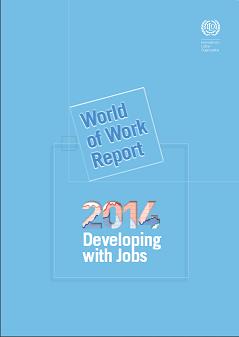Mudde, C. (2014) “The European Parliament elections show the increasingly fragmented nature of European party systems“, LSE EUROPP, 12 June. Most coverage of the European Parliament elections has noted the rise of several far-right and Eurosceptic parties across Europe. Cas Mudde argues, however, that a more important trend was toward increasingly fragmented party systems. Presenting a series of numbers from the elections, he illustrates that ‘big parties’ are experiencing …Read More
Mending A Dysfunctional European Union
Zielonka, J. (2014) “Mending A Dysfunctional European Union“, Social Europe Journal, 11 June. The EU is not an end in itself. Europe needs a vision of functional integration orchestrated and managed not just by states, but also major regions, cities, NGOs and firms. Elections create winners and losers; the former suffer from hangover due to the excess of champagne; the latter suffer from hangover caused by depression. These last …Read More
World of Work Report 2014: Developing with Jobs
ILO (2014) “World of Work Report 2014: Developing with Jobs“, International Labour Organization Research Department, June. Since the eruption of the financial crisis in 2008 much of the global policy debate has focused on advanced economies and their ability to cope with the impacts of the crisis. During this period, a major policy shift has taken place in developing countries that has often gone unnoticed. Notably, in the face …Read More
The European Union does not have a democratic deficit – it has a democratic surplus
Cooper, R. (2014) “The European Union does not have a democratic deficit – it has a democratic surplus“, LSE EUROPP, 11 June. The European Union has often been accused of having a ‘democratic deficit’. Sir Robert Cooper writes that what the EU actually suffers from is a ‘democratic surplus’: elections are held, but turnout remains extremely low due to a lack of interest among citizens. As national parliaments appear …Read More
Lowflation: Should We Fear Stable Prices?
Kahn, R. (2014) “Lowflation: Should We Fear Stable Prices?“, Global Economics Monthly: June 2014, Council on Foreign Relations, 10 June. Overview: Bottom Line: Low inflation may be symptomatic of deeper problems, such as inadequate demand or central bank policy failures. The costs of low inflation could be high for European economies. There is a new Washington consensus, and it consists of a simple message: low inflation threatens the global …Read More
Mind the Gaps: The Political Consequences of the Great Recession in Europe
Muro, D. & Vidal, G. (2014) “Mind the Gaps: The Political Consequences of the Great Recession in Europe“, Eurocrisis in the Press, LSE EUROPP, 10 June. The financial crisis that started in 2008 had an unanticipated magnitude. What at first glance appeared as a manageable frailty of the financial sector rapidly derived into a Great Recession with on-going continuity into 2014. The enlargement of a gap or, rather, three …Read More
Undercutting the future? European research spending in times of fiscal consolidation
Veugelers, R. (2014) “Undercutting the future? European research spending in times of fiscal consolidation“, Bruegel Policy Contribution, Issue 2014/6, June. Are R&D budgets being smartly used to address growth? How is the crisis affecting public Research & Development budgets across the EU? The crisis seems to have widened the gap between EU countries in public R&I expenditure. Even though the EU budget serves as mechanism to somewhat ease the …Read More
The ECB and Sisyphus: it won’t be finished unless it does QE
Magnus, G. (2014) “The ECB and Sisyphus: it won’t be finished unless it does QE“, Pieria Online, 09 June. Mario Draghi, 5th June: “Are we finished? The answer is no… within our mandate, we’re not finished yet.” After the announcements made following the ECB’s June meeting, we hope this wasn’t an idle remark from the President because the ECB will almost certainly have to come back and do more …Read More
An investigation into the procyclicality of risk-based initial margin models
Murphy, D., Vasios, M. & Vause, N. (2014) “An investigation into the procyclicality of risk-based initial margin models“, VoxEU Organisation, 06 June. Initial margin models are often procyclical, raising margin requirements at times of market stress, which can exacerbate that stress. This column proposes quantitative measures of procyclicality both over the cycle and over liquidity planning horizons. If market participants disclosed these procyclicality measures of their margin models, this …Read More
Bail-in rules in EU banking union and financial stability
Micossi, S. (2014) “Bail-in rules in EU banking union and financial stability“, VoxEU Organisation, 05 Ιουνίου. The European banking union is in pressing need of a unified banking resolution mechanism, but public bail-in has become increasingly unpopular. This column details new legislation towards a single resolution mechanism in the EU that minimises public exposure. The shareholders of an insolvent bank will be the first to take the hit, followed …Read More





